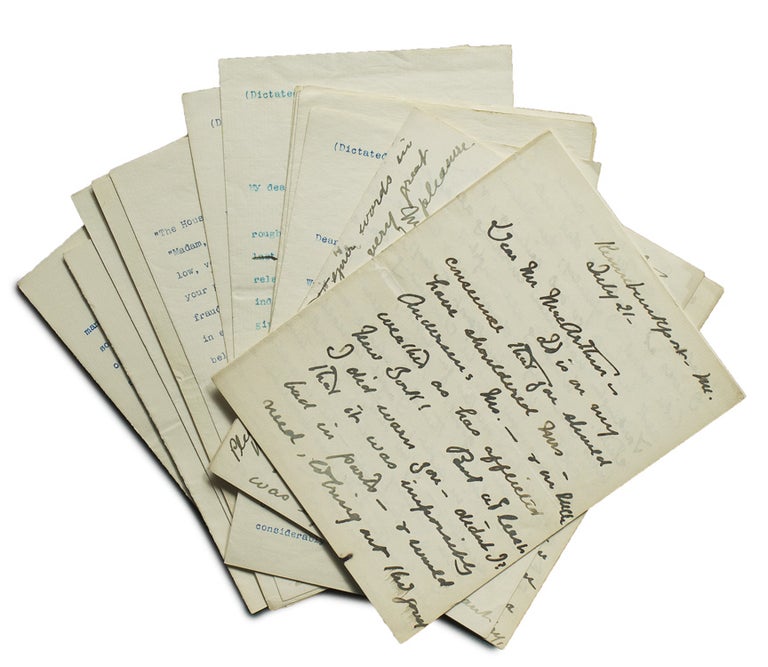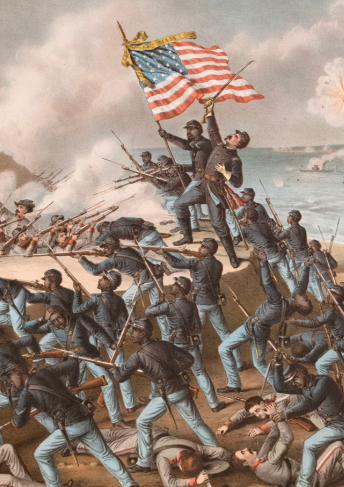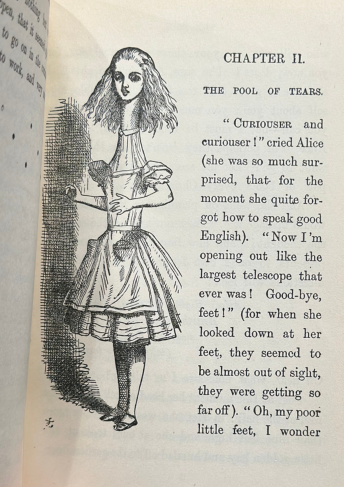
Archive of 6 Autograph Letters Signed and 18 Typed (Dictated) Letters Signed, to Harpers editor James MacArthur. WITH: Typescript, "Chapter XXXIII" from The Awakening of Helena Richie, 2 pp, heavily annotated in manuscript.
Boston or Kennebunkport, Maine or Dedham, Mass: 1904-1908.
Price: $1,500.00
About the item
Approximately 95 pages. 8vo & 4to. Very good condition.
Item #308370
An archive of correspondence by the novelist, essayist, and short-story writer Margaret Deland (1857-1945), whose work examined the moral challenges faced by American women at the turn of the century, to James MacArthur, her editor at Harpers. Deland is perhaps best known as the author of John Ward, Preacher (1888), Old Chester Tales (1898), and The Awakening of Helena Richie (1906). The present letters concern works published and in progress, text corrections, payment terms, plot lines, reactions to her books, publicity, etc. Also included are one and a half-pages of the typescript of one of The Awakening of Helena Richie, profusely annotated, and with another sheet of holograph additions and corrections.
MacArthur (1866-1909) was a literary advisor and editor at Harper's from 1901-1909, during which period Harpers published several of Deland's works, including Helena Richie, Dr. Lavendar’s People (1903), The Common Way (1904), An Encore (1907), and Where the Laborers are Few (1909), and Harpers remained Deland's publisher for the rest of her career. "Throughout her career, Deland's work reflected the dilemmas facing women at the turn of the century and advocated moderation, balance, and individual responsibility as the best responses to the changing social order. Critic Diana Reep sums up Deland's strength as a storyteller and social commentator: 'Her work is a mirror of the relationships, the problems, the moral crises of an age'" (ANB)
Excerpts:
December 22, 1904: "That poor little book, ‘The Common Way’, is on my mind, and indeed, I might say, on my conscience, becaukse I feel that if I had not struck my publishers for twenty per cent royalty, the little, wretched book would have been more satisfactory to them and to me … really and truly, don’t you think it is hard to pay $1.25 for those little, preachy essays, when a nice, fat story book can be had for $1.10?....”
November 24, 1905: "Mr. Alden wrote me . . . urging me to come to New York for the Mark Twain dinner [celebrating his seventieth birthday]. The honest truth is that, considering Mr. Clemens' remarks in regard to Mr. Ames and Mr. Deland, I am inclined to think it would not be becoming for me to be among the people who gather to do him honor.I don't want to go into the matter with Mr. Alden . . . [I]f you could find the time to tell him anything of Mr. Clemens' visit to Boston, and the astonishing attitude which he assumed, in regarding Mr. Ames and Mr. Deland as scoundrels, it would, I think, make Mr. Alden feel that I did not mean to be ungracious or unappreciative of Colonel Harvey's kind invitation . . . ."
April 15, 1908: “I have never seen an interview which did not make the interviewed look like thirty cents … At the same time I don’t want to be pig-headed about it … if you think it would be good for my forthcoming book, I will do what I can to carry out your wishes”.


